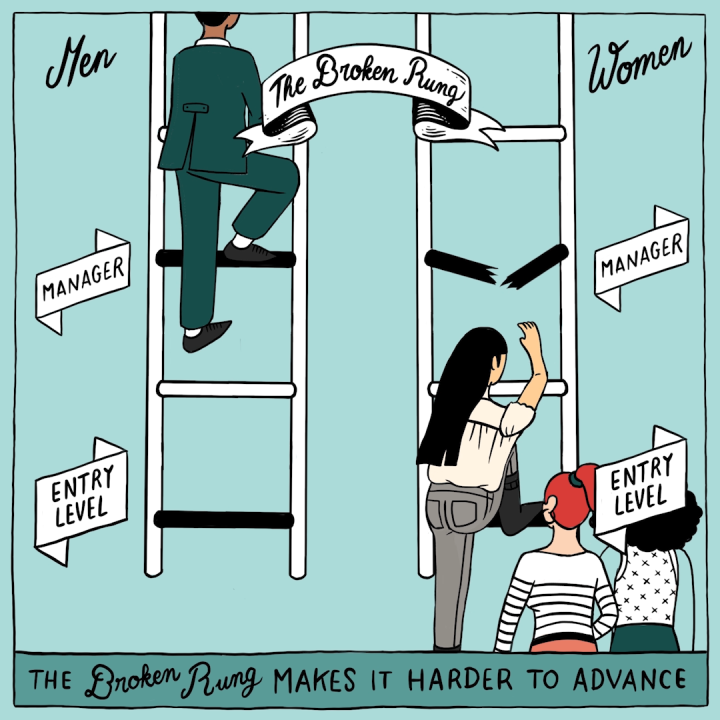
The Future is Female: If We Fix the Broken Rung
The future ‘needs to be more’ female. In the 2020 Women in the Workplace report by Lean In & McKinsey, “between 2015 and 2020, we made slow but steady progress in women’s representation. But a broken rung at the first step up to manager continues to hold women back.”
I have presented on the topic of the “broken rung” and for most people in the audience this was the first they had heard of this reference. What the “broken rung” reveals is that it holds women back.
What does this mean? “For every 100 men promoted to manager, only 85 women were promoted—and this gap was even larger for some women: only 58 Black women and 71 Latinas were promoted. As a result, women remained significantly outnumbered at the manager level at the beginning of 2020—they held just 38 percent of manager positions, while men held 62 percent.”
It is this problem that the report highlights, as the primary underlying issue as to why women are not reaching higher levels of leadership at the same rate as men. Until the “broken rung” is no longer broken, women will continue to be underrepresented and it’s even worse for women of color.
For those of you in human resources, hiring, or departmental managers, take a look at the processes you have, or may not have, for someone to get to a first-level manager position. This important “rung” in the career ladder is broken and you can fix it.
Ask yourself, do you have a transparent and/or easily accessible process for a staff-level person to be a first-level manager in your company? Can your employees articulate your promotion process? If not, therein lies the problem. Getting to a first-level manager position can be more of an obstacle course rather than a career ladder.
We can do better. If we are deeply committed to an inclusive and diverse world at top levels of leadership, then it needs to start at the first rung of the career ladder to a first-level manager. It is at this first rung to management, that represents the most important step for women, especially women of color.
Top leadership at any company needs to reflect the diversity of its employees. Until this happens, your employees of varying gender, race, and ethnicity may never really feel a sense of belonging and representation. More importantly their voices and perspectives are continuously left out. Given the diversity of society, this is a mistake.
A 2015 McKinsey & Company report looked at the top management and boards of 366 public companies in various industries in Canada, Latin America, the United Kingdom, and the United States and found that companies with leadership in the top quartile for gender diversity were 15% more likely to have financial returns above their industry median and companies with leadership in the top quartile for racial and ethnic diversity were 35% more likely to have financial returns above their industry median.
The Future is Female and so much more. Without this bold statement, we will continue to have leadership teams that do not represent the true fabric of our companies. Without diversity and ultimately inclusion, decisions that impact industries and society at-large will be done in a vacuum. Until leadership in organizations include people like me, female and Hispanic, I will never feel that I am represented, or worse, feel like I belong.
The Future is not only Female but women of color. Representation matters. Read the full 2020 Women in the Workplace report, it starts with the facts to make progress.
Financial Services Professional at Knights of Columbus
3yAnna it’s also the Latino population which will be at 90 million by 2030.